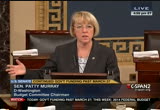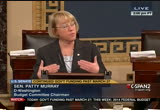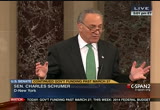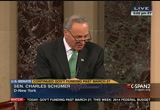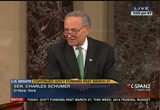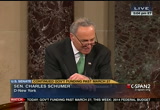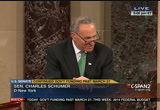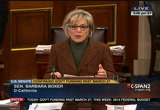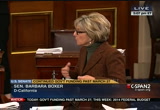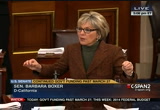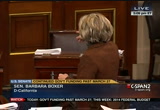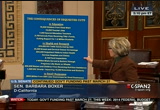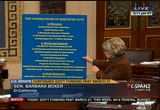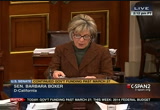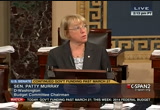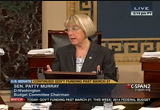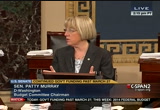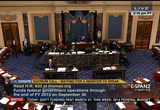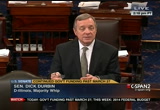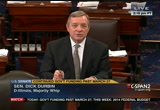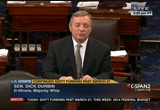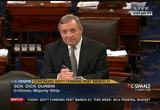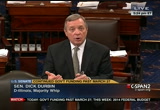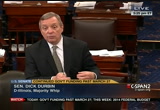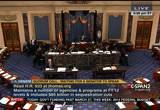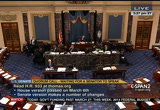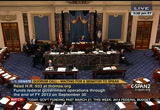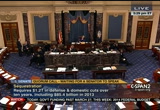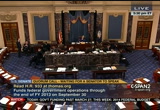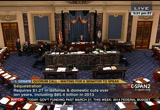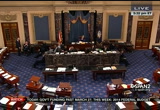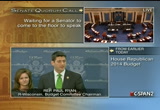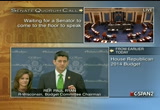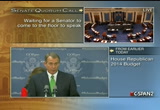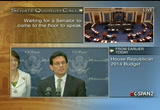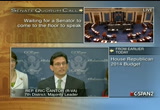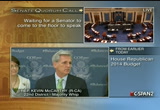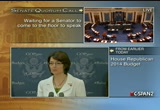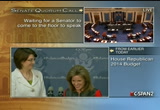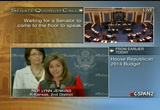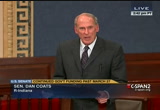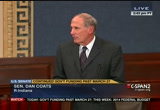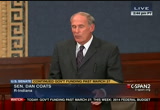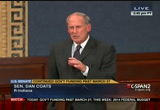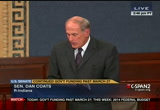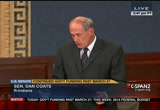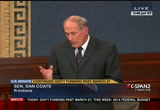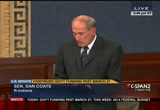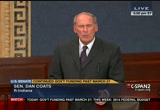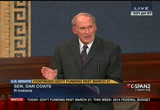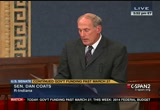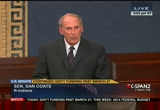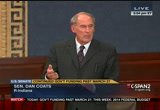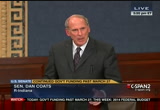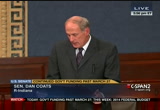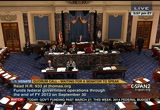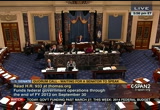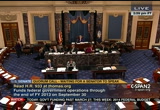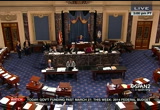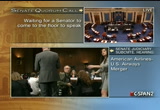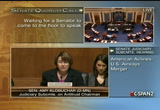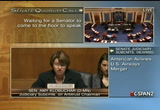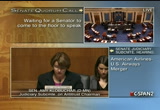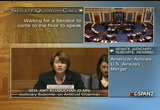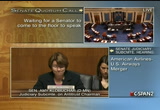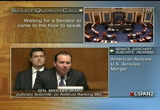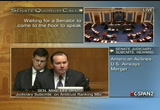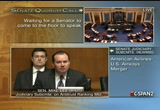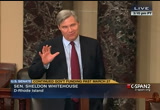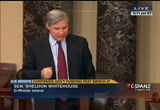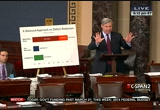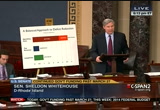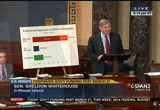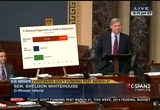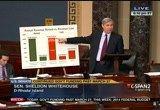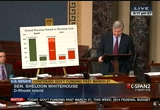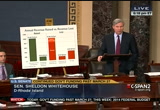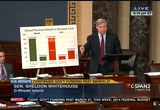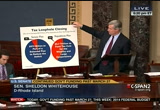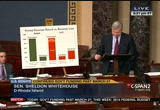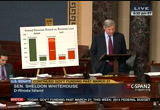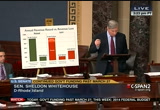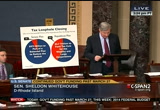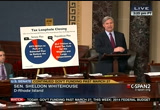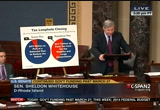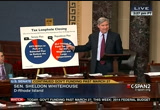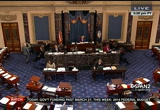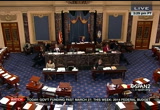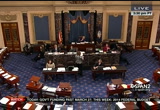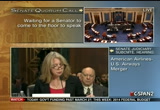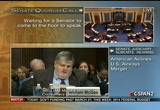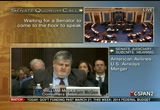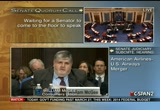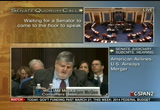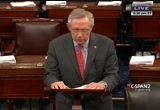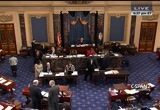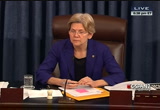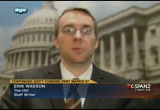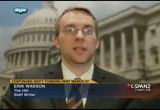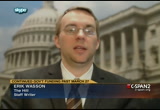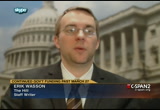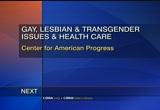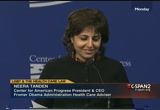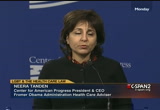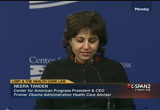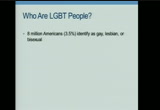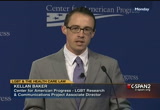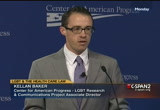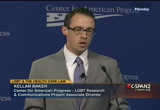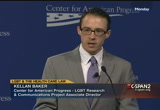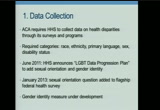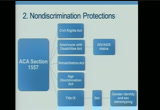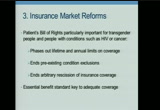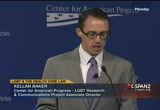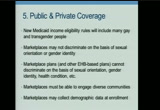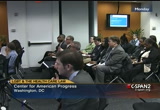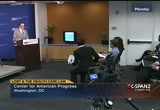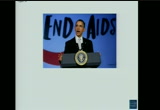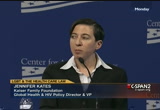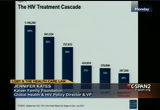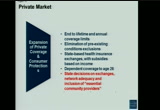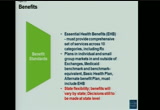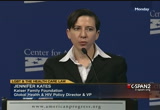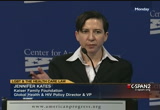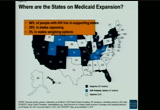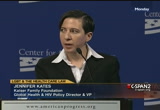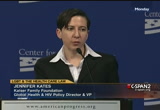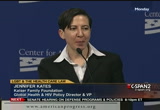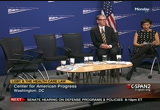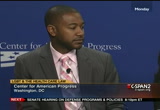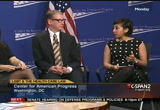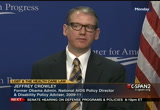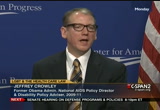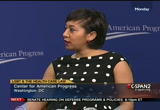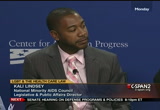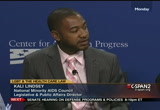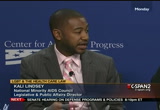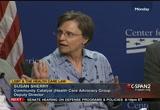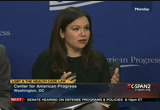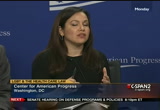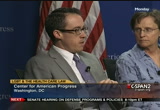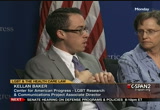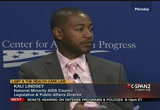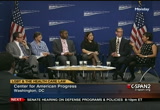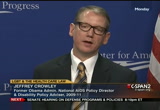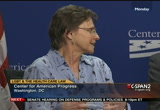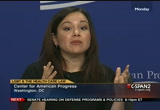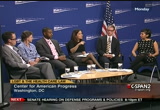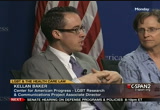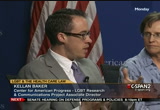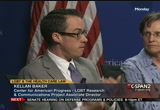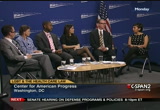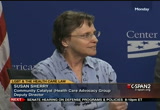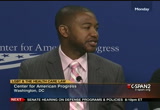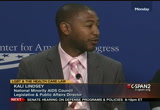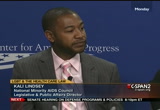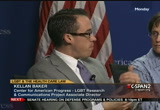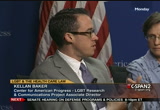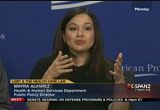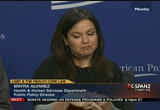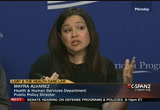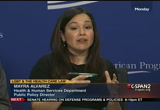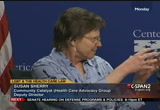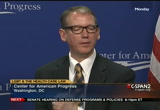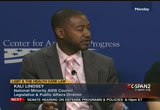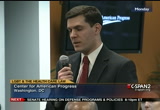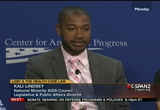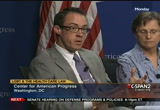tv U.S. Senate CSPAN March 19, 2013 5:00pm-8:00pm EDT
5:00 pm
no one out here, no one talking. and we're twiddling our thumbs waiting for the clock to run out on time. madam president, we could be here debating our budget, moving forward, having the debate the republicans called on us to have and moving it forward. we could do it tonight and tomorrow or thursday and probably be done thursday or friday. but because of this delay, now we get to wait and watch the time run out until thursday night, and we will be here friday, saturday, and sunday doing this debate. and aim sure that our republicans will say, well, we should be doing this during the week when everybody is watching. we're here, we're ready to go. we want to have this discussion. i want to here what they want to say. i would hope they'd twonts hear what we want to say and vote on 0a budget and move it out. but we are here waiting. we're ready to debate. i would hope that our republican colleagues would say, yes, it's
5:01 pm
time to debate. let's move this budget forward. we've been talking about it forever. let's move this forward and let's get it budget process going. i'm ready as chair of the budget committee. i know we as democrats are ready to go. let's yield back the time on this. everyone knows what the end is going to be. let's get it done. let's get to moving, and let's have debate that's critically important to every family, every community and the future of our country. thank you, madam president. i yield the floor. mr. schumer: madam president? the presiding officer: the senator from new york. mr. schumer: well, first, let me thank the chair of the budget committee, my friend and colleague from the state of washington, for her remarks and, even more, her excellent work on putting to thputting together ac budget. that may be the reason why our colleagues want to delay. for four years they've had a great time saying, you don't have a budget. you don't have a budget. it was the only thing they had to say because the actual confines of their budget is so far away from what the american people want they couldn't get into the details. nobody wants to end medicare as we know it.
5:02 pm
nobody, as in the ryan budget, wants to reduce taxes dramatically on the wealthiest americans -- 39% to 25% -- and then take away deductions from middle-class people, good deductions that make sense like the mortgage deduction, the charitable deduction, the retitle deduction, the health care reduction. no, no wants to do that. and no one wants to eat our seed corn. investment in education, investment in infrastructure, investment in sign b scientific research in order to keep narrow loopholes open, reductions if you move the business overseas. no, they don't want to debate that. but now we have a budget. because of the leadership of the chair of the budget committee and the members of her committee -- and, by the way, this is no -- this is not a small group of democrats. it runs from our most liberal members to our most conservative
5:03 pm
members, all united around the budget that is fiscally responsible. it meets the gramm-rudman -- i mean, i'm on old guy -- the simpson-bowles constraints, budget target. it invests in jobs in the economy, and closes loopholes and preserves the middle class' ability to grow and proceed. so, we now are, you know, in this 30-hour thing. we could actually be debating the budget while those 30 hours tick. we don't have to be sitting here doing nothing. and one of our colleagues said, he'd like to debate the budget two weeks from now. why is he putting things off? well, i guess if i had their budget and looked at it compared to our budget, that's what i'd want to do. but that's not fair and that's not right. so i just came to the floor to join my colleague from washington in pleading with our colleagues, let's have a real debate on the budget.
5:04 pm
the lines are squarely -- are sharply drawn. our budget and your budget contrast. let the american people hear the debate and decide who they like. we're pretty confident they'd like ours better. you no longer have the talking point, we don't have a budget. so instead you're preventing us from talking about our budget. it is not fair, not right, and doesn't really help the process. so i would hope that i know there are some members on the other side of the aisle who have some objections to the c.r. in certain areas. we're all hurt by the c.r. by the way, i'd say to my colleagues, with aens to get rid of the horrible things that are happening in the air traffic towers, vote on our budget. we do not do sequestration. we undo sequestration and it might pave the way to doing more things this year. but we sit here and let the clock tick. one thing i can tell -- i know my good friend harry reid --
5:05 pm
ware noweare not going to i cane budget can can down the road foo weeks. we will be here, whether it has to be saturday night, sunday, monday, and tuesday. we will be here. there's 50 hours fl w. we will have a nice, full, open debate. and then do our votes. it's a logical request. i don't think there's any good argument against it. i haven't thought of one yet. and i would urge my colleagues on the other side of the aisle, we would say, mr. leader, mr. republican leader, mr. republicans, let us debate that budget. tear down the wall of not debating. and let us show our budget, you show yours, and let the american people decide. i yield the floor. mrs. boxer: madam president? the presiding officer: the senator from california. mrs. boxer: madam president, i want to add my words to those
5:06 pm
eloquently spoken by our budget committee chairman, patty murray, and one of our leaders here, the able senator from new york, senator schumer. we are waiting for hours and hours. i can only imagine what the public thinks when they look down on this floor and absolutely nothing is happening. well, i came down here not knowing that my friend and colleague was going to be here. we, i guess, both had the same sense of it, that we had to explain to the american people why this is happening. there's only one reason: republicans are stalling and stalling and stalling and filibustering and filibustering, and filibustering. they're not doing a talking filibuster. they're just letting the clock tick. now, they are filibustering a
5:07 pm
very important bill, madam president, to keep this government open. now, they say they want to keep the government open. they don't want a shutdown. so why not get that vote done with? senator mikulski has led in a beautiful way with senator shelby -- a very bipartisan fashion. let's vote on that bill, keep the government open, as senator mikulski said, "show the country we can work together," and get to the one thing the republicans have been saying, not for months but for years, that the democrats have not done a budget. now, the truth is, instead of doing a budget, we did the budget control act. so of course we distinguis did . as a matter of fact, the budget control act was actually, in many ways, more specific than a budget. but set that aside, they went out on the campaign trail, they attacked democrats, "where's your budget? where's your budget?"
5:08 pm
well, guess what? under the able leadership of my friend from washington, senator murray, there is a budget, and it is well-done. and it has strong deficit reduction and strong investments. it's balanced in a way that the ryan plan is not. it saves medicare where he destroys it. it invests in education and infrastructure, where he destroys that. his budget budget is a wrecking. our budget, you should the able leadership of senator murray, is a path of -- an optimistic path to our future, not a pessimistic, painful plan that mr. ryan has put forward in the name of the republican parliamentarparty.now, you are a filibuster, and it is possible that we could end it, but i will tell you this: we are trying for some friendship and comity across the aisle right now. we want to keep the government
5:09 pm
open. okay, so the senator from kansas stood here last night and said, the reason he is filibustering -- he never used that word, but the reason he is insisting that we spend 30 more hours, 40 more hours, 50 more hours on this, last year's business, which is last year' year's appropriation, is because he demands to have a vote on his amendment that he feels very strongly about. and it has to do with making sure that the sequester doesn't hit our air traffic control towers, meaning they can stay open. i agree with the senator from kansas. we should keep those air traffic control towers open, but i want to say to him -- and maybe we have a chart here. i can't get to it. thank you. i want to say to my friend, who isn't here -- who's leading the
5:10 pm
filibuster -- this is where we are. we want to restore those air traffic controllers. but i'll tell you what i want to restore in addition to the air traffic controllers in the towers. he's right. i want to restore head start for 70,000 children, madam president. i want to restore 10,000 teacher jobs. i want to restore 7,200 special ed teachers who are working with kids that desperately need help. i want to restore the title i funds that impact a million kids. i want to make sure that we can conduct 424,000 h.i.v. tests that are conducted by the c.d.c. how does it make us a better country when people don't know if they're h.i.v.-positive and they spread that virus? how about the 25,000 breast and cervical cancer screenings that
5:11 pm
around being done? madam president, these are the consequences of the sequester, in addition to the terrible consequences to the f.a.a. and i was here when the republicans shut down the f.a.a., i had se i'd say to my . but suddenly they care about it. good. i'm glad they care about it. i care about it, too. and i haven't talked about the 804,000 outpatient rifts to indian health centers. 2,100 food inbe specks. these are not happening because of sequester. 4 million meals served to seniors. 600,000 women and children aren't getting nutrition assistance because of sequester. national science grants cut, is,000 of them. 902 million cut from loans to our small businesses who are the job creators. and even 1 240*u f.b.i,000 f.b.d other law enforcement personnel.
5:12 pm
so, yes, i say to my friend who is not here -- who is leading the filibuster, the senator from kansas -- i hope he comes and shows up -- i hear him. i feel the pain he feels. i feel the pain he feels for a his state. i have a list that i won't bore you with that shows the cuts to my state. it is painful. but how do you solve it? not by amendment after amendment after amendment on a must-pass bill that the house has said, keep it simple or the government shuts down. not that way. but by turning to the democratic budget. where senator murray and the colleagues there have restored those cuts and they won't other ways to cut, better ways to cut, sensible ways to cut. so i call on my friends on the other side of the aisle, if you want to waste 10 hours, 20, 30, 40, 50, 60, 70, 80 hours, it is your call.
5:13 pm
we will be here. but we are not going to put off the passage of the budget. it is too important. we will be here until it is done, and i yield my time back, and i thank my colleague so much, senator murray, for her leadership on this. mrs. murray: madam president? the presiding officer: the senator from washington. mrs. murray: i want to thank the senator from california, the senator fromnew york, the senator from alaska was here just a short time ago expressing the same frustration. we are ready to go. we have a budget. we want to debate it. we want when the american public sees the values in our budget and what we are fighting for to make sure that the middle class has an opportunity that we balance our budget in a responsible way and work to manage our debt in a responsible way, that we can do that and build on the promise of hope that this country has always had, that we are going to have a solid budget passed. we want to get started. where are our republican colleagues? on this empty floor?
5:14 pm
they're filibustering. they're counting down the hours so that sometime late thursday night we can finish the continuing resolution, after silence, silence, and more silence. it will pass. it has to pass. they all know that. we all know that of the none of us love it but we all recognize the situation we're in. we're ready to move to the budget tonight, tomorrow morning, have the debate, full and open, do the amendment process, or we are going to be doing it friday, saturday, and sunday. fine with us. we're ready toed to do it. but -- we're ready to do t but, madam president, for all of our republicans who said we don't have a bullet, we do have a budget. we're ready to debate if. we're ready to debate about it. we're ready toasmght i would just ask our republican colleagues, yield back the time, vote the wait we're going to vote, everybody knows how they're going to vote at this point, give us an opportunity to get on the budget, and to move it forward in a responsible way. because at the end of the day, the clock is ticking on our
5:15 pm
country as well fl we have families who want know whether they will have the ability to send their kids to college or pay their mortgage. we have communities who want to know if section 8 hous housing l be there. we have men and women in our military who are wondering whether they'll be furloughed. we have military hospitals that are telling soldiers who are coming today home in the next -- a few months that they may have to wait for appointments because of the furloughs that are taking place. madam president, we're ready to move a budget, we're ready to get the country moving again. we're ready to get past this managing by crisis, shutdown, c.r. and all these things and get back on the right path. but we can't do it when there's a filibuster going on on the floor and we're not allowed to bring our budget up for debate and we're sitting here ticking off the clock on an empty, silent senate. i urge our colleagues to allow us to move forward. and i yield the floor.
5:16 pm
5:17 pm
mr. durbin: madam president? the presiding officer: the senator from illinois. mr. durbin: i ask consent the quorum call be suspended. the presiding officer: without objection. mr. durbin: madam president, all across america people are calling their cable providers and they're asking if they can get a refund for c-span coverage of the senate. there seems to be some concerns that there are no serious debate underway, no serious votes being taken, and the hours just continue to flow by. and i can understand the frustration of the american public watching this chamber. we're going through a 30-hour interval. the senate is kind of designed on 30-hour intervals. and this is a 30-hour interval before we enter the next 30-hour interval in the hopes that we will ultimately get to a vote. does it have to be this way? of course not. it shouldn't be this way. i understand the depth, the feeling that some senators have about a variety of issues, and they've come to the floor to
5:18 pm
express them. in fact, i agree with some of their positions. but there comes a point where you have to say i didn't win my battle today. i'm not going to get my day in court. let's at least go on with the business of the senate. because you see we have an important responsibility ahead of us. senator murray spoke before me. she is chairman of the senate budget committee. she has a herculean task and she's up to it. in fact, she's shown herself to be an able leader of the budget committee in producing a budget proposal for the next fiscal year. and it's a balanced proposal. it's one that i think is sensible. now, i have some background in this at least by way of having been a member of the simpson-bowles commission. i sat through a year of committee hearings and debates that led to a vote on a proposal to reduce the budget deficit. and so i've heard some of the arguments that have been made on both sides. i then joined a bipartisan group of senators, so-called gang of
5:19 pm
eight, and we sat down to try to do the same. and we spent over a year doing exactly that. so i kind of know where this comes down. my approach to this, an approach being followed by senator murray with her proposed democratic budget resolution is, yes, the deficit is a serious problem. the debt of america is a serious problem. when you borrow 40 cents for every $1 you spend, it's unsustainable. we have to deal with that issue and deal with it honestly. first and foremost, let's do it in a fashion that builds the american economy, that creates good-paying jobs. you know, if you want to find your way out of a deficit, put people to work first when they're paying taxes as opposed to drawing benefits. that really tips the scales in the right direction in dealing with the deficit. so, what the murray budget does, the democratic budget resolution will do is to make investments in the things that do produce jobs in america. and they're very obvious.
5:20 pm
education: who's going to argue with that one? is there a person standing in the senate who didn't rely on their own education and training to progress in life? didn't you tell your son and daughter the same thing when they were making their life choices? stay in school. get a good education. education is an investment. it's part of the democratic budget resolution. secondly, the notion of research and innovation. one of the most heartbreaking parts of sequestration to me was we we took $1.6 billion away from the national institutes of health. that is the organization that does the medical research to find new cures, new vaccines, new medical devices so that people can survive when they have a diagnosis that could be fatal, to make sure that children have a chance at a full life. we're cutting that in the name of budget deficit reduction, and that is troubling. the third area is infrastructure. i spent the entire day with contractors from my state of illinois, people who represent
5:21 pm
the road builders, for example, bridge builders. they believe -- and i do too -- that investment in infrastructure pays off over generations. we just had a meeting on the waterway system. the mississippi river, such an important part of national commerce. we need to improve the dams and the locks on the mississippi and the adjoining river such as the illinois. the murray budgets deal with investments, investments to build the economy, investments to spark economic growth. but then it goes on to seriously reduce the deficit. the goal in this, of course, is to not only meet but surpass the goal of the simpson-bowles budget commission in terms of deficit reduction. the way that senator murray does it, of course, is in a balanced approach, which includes spending cuts which must be part of it as well as revenue. i think that that is the sensible approach to it. unfortunately, on the other side
5:22 pm
the argument's made is we can't raise any more revenue. i know better. anyone who's taken a close look at the tax code in america realizes that we literally forgive tax obligations of over $1 trillion a year in our tax code. some of them very worthy. an induction for the home mortgage, for example. deductions for charitable contributions, for example. these things are worthy of our tax code. but there are other things which cannot even be explained. why in the world would we put in our tax code a provision which says if an american business wants to move jobs overseas, we will give them a tax break to do it? i don't think so. that should be a decision, if they make it, with no encouragement from our tax code. rather, let's encourage businesses to stay in the united states. similarly, senator carl levin of michigan has really made a concerted effort to investigate and expose the offshore tax havens that cost us over $300
5:23 pm
billion a year in taxes owed to the united states, people that park their money in far-away places with strange-sounding names end up escaping tax liability. why do we let that happen? the average family across america, the average business across america can't escape and doesn't even try to escape its liability. yet, we built into the tax codes these cayman island little fiascoes in bermuda and all the places they head to. we could put an end to that in a hurry and reduce the deficit. in addition, senator murray and the budget committee will face the entitlement issues. they're important. if you left the entitlements without change, the cost of health care would lead us to further bankruptcy in america. they are addressing it, as we should. while protecting the integrity of the programs, they're finding ways to save money to reach the
5:24 pm
goal. wouldn't this be a great debate to have on the floor of the senate, to have that budget resolution before us, to actually have some votes on amendments? well, it would be. but, unfortunately, because of the objection of several republican senators, we can't get to it. so the clock is continuing to turn, and we're watching the hours slip away. and now we're facing the possibility of a weekend session because one or two senators don't want to bring this matter to a vote. that's unfortunate. maybe they're right to exercise that kind of power in the senate, but it isn't fair. it isn't fair to this institution or to the american people who count on us to do more than just waste time on the senate floor. they count on us to use our time to solve problems. so i urge my colleagues on the republican side who are holding up these votes, who are engaged in this filibuster, for goodness' sakes, let's move on. let's vote on the continuing resolution and let's start the debate, the important debate on the budget resolution. let's get this done.
5:25 pm
for the longest time we were preached to by members on the other side about no budget resolution. i even heard a speech today from my friend from texas, the senior senator, talking about how derelict we've been in not bringing up a budget resolution. we want to. we're being stopped by republican senators. they are the ones who won't let us bring this to a vote. i hope they'll change their mind and soon. i'd like to spend next week back in illinois with my family, as most senators would, during passover and the easter seasons. more importantly, i'd like to get my job done before that happens. and to do that, we ought to be working on the floor right now. instead of an empty floor, it should be a floor filled with senators debating the issues and voting on them. i think that's what we were elected to tkofplt -- do. and i think the people on c-span would like to see activity on the senate floor. madam president, i yield the floor and suggest the absence of a quorum. the presiding officer: the clerk will call the roll. quorum call:
5:41 pm
5:42 pm
the majority leader came to the floor to propose a unanimous consent request that we move forward with this continuing resolution. he's right, we should move forward with this. but i was puzzled by the fact that he said we've been standing around here now looking at each other and -- and we're not doing anything. well, we haven't done anything for the past 36 hours while we're trying to figure out who ought -- who has the right to offer an amendment and what -- whether that amendment will be agreed to in part of this unanimous consent request limiting the time. the problem here is, is that, you know, we came to the senate believing that each senator had the right to offer any amendme amendment. that's what we're here for. to debate that amendment and then take a vote on that amendment. the winners pass the amendment and -- and we move on.
5:43 pm
so it's not a question of i won't offer my amendment unless i pass it. let's debate it, see how each of us votes and then go forward. but the majority leader essentially has simply said he will decide how many amendments will be offered and which amendments won't be offered, denying senators the opportunity to bring their amendment to the floor. and so there was an objection to his request to move forward because senators had been denied that opportunity. that's really not what the senate's all about. that's not what people elected us to do. we've been in an empty chamber here basically talking to no one or, at best, to each other and not moving forward with funding this government for the next six months in this fiscal year. not -- not a small matter. so we're all ready to go forward but we would like to have the right, particularly as a minority, to offer our amendments to this resolution
5:44 pm
which provides for this funding. now, i don't know how i'm going to vote on all these because some of them, i'm not even sure what would be brought forward. but we're here to evaluate those, to make our best judgment, to vote our "yea" or "nay," to be able to explain to the people back home why we voted that way, and then they get to decide whether they want send us back for another term or whether they think we did the right thing. apparently the majority leader has some problems with some of these proposed amendments. maybe he doesn't want his members to have to vote on it because it's a -- it's a tough vote politically. well, what are we here for? we're not here for just to find consensus on everything that goes forward. we have different points of view. and it's understood that we won't always have consent to pass everything that's brought forward and we ought to be debating that. there's different visions here about how we ought to go forward. but the solution to the problem
5:45 pm
of moving forward and getting this spending bill in place, which we obviously have to do, is to simply give members the opportunity to propose their amendments, vote on them, deba debate, vote and then -- and move on. so over these last 36 hours, we -- how many of these amendments could we have been debating and -- and voting on? we probably could have cleared out all the amendments that were proposed by various members easily in half that time or -- or much less. and that's why we're here. we're in divided government so there's going to be two sides to each issue, but this standing around and then deciding -- having one person, the majority leader, decide whether or not he will subject his members to a vote because he thinks that might put them in a difficult political situation, you know, it works both ways. his side can offer their amendments. we can offer our amendments. hopefully we're offering amendments for the good of the
5:46 pm
country and not some for political gain or gotcha amendments. but, nevertheless, that is the right of the senator to offer whatever amendment he or she deems best in his own estimation or her own estimation. now, we're sitting here facing a serious debt crisis. some have said this debt crisis isn't here yet, so we have more time to deal with it. i reject that fact. i reject that because, if $16.7 trillion of debt isn't a crisis, i don't know what is. and at the rate that we're going here in washington, we don't have more time to waste. but don't take my word for this. just last week at a hearing of the joint economic committee on the debt crisis, we found widespread agreement from the witnessewitness across the ideal spectrum on a v.o.a variety of s
5:47 pm
including dealing with our long-term debt issue in a timely fashion. reforming health and security programs to rein in spending and preserve much-needed benefits. let me relat me relate some of t testimony. former senator judd gregg who serves as cochair of the pa into fix the debt stated this: "on our current path, this nation goes bankrupt." now, that statement was -- a similar statement was made by judd gregg, a republican, by a democrat, erskine bowles, who headed up the president's own fiscal commission. and former senator -- governor bowles and chief of staff to former president clinton said, this is the most predictable financial crisis in the history of the country that's looming. and this was several years ago. and nothing has gotten better
5:48 pm
since then. wii juswe just careen closer anr to the tipping point. senator gregg noted that mandatory spending is a primary -- unfortunately, all of the measures put in place have ignored smart entitlement reforms to control spending over the long term and comprehensive tax reforms to make the tax code more ta efficient. we all heard that before from people all across the political speck tom, republicans and democrats, liberals and conservatives. there is a growing consensus that all of these elements must be addressed. douglas holtz-eakin, former director of the congressional budget office noted that the level and projected growth of federal debt are is a threat to future prosperity. the nation, he said, despite claims to the contrary, remains
5:49 pm
on a damaging debt pathway. dr. holtz-eakin countered arguments that reducing the debt is not urgent because the crisis is a distant threat by pointing out that "the u.s. is already paying an economic price for the excessive federal debt in terms of slow job creation and growth." he went ton say, "the obvious colleagues is that additional deficit reduction is needed to avoid debt-driven economic stagnation." and he called for a strategy that shifts the focus of spending control to the feed entitlement reforels an shifts the debate on taxes away from harmful higher marginal tax rates in terms of favor pro-growth tax reform. alice rivlin, the first director of the congressional budget office and cochair of the debt-reduction task force for the bipartisan policy center, as well as a number of other distinguished positions that she's held, as well as as also
5:50 pm
being a former resident of my home state of indiana, she insisted on the importance of a long-term budget plan that will halt the projected rise in debt. she said, "the prospect of debt growing faster than the economy for the foreseeable future reduces consumer and investor confidence, raises a serious threat of high future interest rates, and unmanageable federal debt service, and reduces likely american prosperity and world influence." she stressed in her testimony the urgent need to act now to get the federal debt in control before events overtaking us. a sense of urgency was unmistakably present during this hearing, and we read about it in the paper every day, we read it from columnists, we hear it on the radio and the television. we hear it on the talk shows. why can't you get together and get this thing solved and
5:51 pm
resolved so we can move forward? you're holding down the growth of the economy? you're keeping people out of work. half of our historic average coming out of a recession. we all know a significant percent of the mo enwe spend here has to be borrowed -- borrowed in china, saudi arabia, foreign entities. that is no way to sustain and maintain a healthy fiscal situation in this cufnlt our final witness at the hearing, simon johnson, a senior fellow at the peterson institute for international economics, called for significantly more long-term debt reduction than has been contemplated many of the proposals thus far. will thlet me repeat that. simon johnson, not known as a right-wing or conservative economist, said that more long
5:52 pm
term debt reduction than has been contemplated in many of the proposals so far need to be looked at, suggesting that the u.s. should aim at a national debt in the range of 40% to 50er p of g.d.p. rather than our current 90 ped to 100 ped. in discussing how much time we have to being, a he said, "we have no idea but we need to start now. we absolutely should start now. we should be spending each day here working okay long term debt reduction plan because unlike the haphazard rushed legislation we have seen over the past several years, a real, credible, long-term fiscal plan cannot happen overnight. it requires bold spending reforms. it must include a way to restructure programs like medicare and social security so that we can prevent them from going bankrupt and preserve benefits for current and future retirees sm.
5:53 pm
let me state that again. those of us who have stood up, taken the stand on dealing with these so-called political suicide issues -- medicare, medicaid, and social security -- are saying that we need to do something now to prevent these programs from becoming insolvent or less solvent, to prevent benefits having to be reduced or massive tax increases on the next generation to be imposed in order to keep them solvent. we want to deal with that now so that we don't undermine these programs. those who say we should not touch medicare are simply saying -- not being truthful with the current and former beneficiary -- future beneficiaries of that program. and the same is for social security. they are sumly saying, we don't want to take the tough decision
5:54 pm
now to address some of these problems and make sensible reforms. we'll be gone when this thing comes undone. what think you're sayinbut they, we're going to turn our heads to the plight of future beneficiaries and even current beneficiaries of these programs by not doing anything. so it's time we worked together to find a solution to this. i think there also is a consensus that comprehensive tax reform is an area where we can find common ground and it is absolutely essential, as our witnesses all stated, essential to providing the growth element so that this country and this economy can begin to grow, additional revenue will come in from a more prosperous nation and from a greater rate of growth be, and that will help us reduce our deficit spending. it'll help us move toward a balanced budget. and it will help us from
5:55 pm
continuing to plunge into more and more debt and more and more deficit. comprehensive tax reform is the best way to reduce the debt, grow the economy, and make america more competitive. grow the economy, not grow more government. grow the economy. that is what makes us more competitive, puts more people back to work. that is what puts us on a pact n a path to american prosperity. these things will not be easy. it will require time, and it will demand political will, and it will demand political courage. so let's get moving. the senate majority leader says let's stop wasting tievmen wast. i couldn't agree more. mr. majority leader, allow members to offer their amendments. your members, our members, ones we like, ones we don't like. we are sent here to make the tough choices, to make our "yes" oregoor our "no."
5:56 pm
so instead of standing here speaking to an empty chamber, members wondering, letting the clock run inso that these amendments can be closed out and never offered you should this bill, we should be debating these. and in doing so, we can get to the point where we will have our final vote and hopefully we will be funding the government going forward. it's called regular business and that ought to be our focus. growing this economy and strengthening it for future generations is the challenge before us. iteit's the challenge of our ti. we need political courage and will, boldness to go forward, but it is absolutely essential for the future of this country, and i suggest that instead of standing around doing nothing, we begin to dress these issues. -- to decrease these issue -- to address these you shalls. with that, i yield the floor. the presiding officer: the clerk will call the roll.
6:10 pm
the presiding officer: the senator from rhode island. a senator: are we in a quorum call? the presiding officer: without objection. we are in a quorum call. i'm sorry. mr. whitehouse: thank you. with the quorum call be lifted, i ask to speak for perhaps up to 15 minutes as if in morning business. the presiding officer: without objection. mr. whitehouse: thank you. madam president, i noted last week the republican leader came to his desk, and he spoke about the budget. and he described our democratic budget as a left-wing manifesto. left-wing manifesto. we have done $1.8 trillion in spending cuts already. we raised $600 billion, a third
6:11 pm
of that, in revenue by restoring the clinton-era tax rates for families earning over $450,000 a year. so in the balance between spending cuts and new revenues, it's already three to one in favor of spending cuts. and in our budget, we propose to fill the gap of the remainder with 50% spending cuts and 50% revenue. and that's a left-wing manifesto. the republican budget changes medicare into a voucher program. the republican budget cuts non-defense discretionary spending to levels lower than at any time since o.m.b. started keeping track a half a century
6:12 pm
ago. the republican budget would set annual domestic spending at rates lower than 1962, when there were no pell grants at all, when 30% of american seniors lived in poverty. but that's not extreme. a democratic budget that is 50-50 spending cuts and revenues, that's a left-wing manifesto. the democratic budget has $975 billion in new spending cuts. it has $975 billion in new revenue in order to close that budget gap 50-50. that means including the deficit reduction that we've already done -- this, of $1.8 trillion -- we will be in total
6:13 pm
at $4.3 trillion in deficit reduction, which is probably just a little bit over the target that most of the experts have given us to hit. and about $2.8 trillion of that, of the $4.3 trillion will come in spending cuts. $600 billion has come in new tax revenue, and $975 billion will come from loopholes for a total of $1.6 trillion coming from new revenues. some left-wing manifesto. $1 trillion more in spending cuts than revenue at a time when billionaires in america are paying lower tax rates than
6:14 pm
brick masons, if that's a left-wing manifesto, then the left wing needs to fire its manifesto writers. left-wing manifesto, that's some pretty high rhetoric. we know where the word "manifesto" comes from of course. it comes from the cold war and the communists. 50% spending cuts, 50% revenue, and the hint is the rhetorical hint is that we democrats with our budget are a bunch of commies. that is high rhetoric, indeed, and it's not coming from some fringe in their rank and file. this is the republican leader of the united states senate. left-wing manifesto. in the face of the obvious facts of the balance of our budget, why might the rhetoric be
6:15 pm
getting so high? what might the republicans be getting so touchy about? well, let's look at where we get the rest of our revenue for our 50-50 budget. we got the first six hundred from restoring the clinton-era tax rates, for folks over $450,000 in income. where do we get our $975 billion in new revenue? well, we go to the republican treasure trove. we go to ali baba's cave for corporations and the rich. we go to the tax earmarks and the special deals that special interests have year after year squirreled away in the tax code.
6:16 pm
now, people think how much can that be? what can it mean when we have money going through the tax code and out but not coming to the government in revenues? well, what is in ali baba's cave? how big is the treasure trove? have a look. this is the amount of money that the united states government collects from individuals in taxes. $1.09 trillion. here is how much goes back out the back door of the tax code to people who have got loopholes, special rates, deductions in the tax code that help them. $1.02 trillion. virtually the same. for every dollar of revenues the united states collects, actual
6:17 pm
revenues from individual taxpayers every year, another 94 cents goes back out through the loopholes and the deductions and the special rates. a grand total every year -- every year -- of more than $1 trillion. and since we budget over a ten-year period, it's $10 trillion in this budget period. $10 trillion. on the corporate side, for every $1 of revenues the united states collects in actual revenues from corporations, another 87 cents goes back out the back door of the tax code through loopholes and special rates and deductions. and again, because we do this over -- that's every year, $157 billion. and again, because we do this
6:18 pm
over 10 years, that's more than $1.5 trillion. if you add these two together, it's more than $11.5 trillion in the budget period. if you presume some modest growth in the economy over those ten years, that number gets to about $14 trillion. so, alli babba's cave of tax code spending is very bill. there is lots of treasure squirreled away in it. and that doesn't even count the billions of dollars that wealthy people and tax hoarders hide offshore. that doesn't even get into the taxi quaition. the i.r.s. has pegged that recently at about $385 billion a
6:19 pm
year. there's one little building in the cayman islands that chairman conrad used to refer to regularly when he was chairman of the budget committee, one little building in the cayman islands maybe five stories tall where over 18,000 companies claim to be doing business. huh? you can imagine what kind of business they're doing there. that's how $385 billion a year never even appears in the tax equation. so this spending that gets done through the tax code, that doesn't get reviewed by annual appropriations, that gets scwirlsquirreled away in there d it's there to stay, it's a big treasure-trove, indeed. not counting offshoring, probably $14 trillion in a
6:20 pm
10-year budget period. for those who are clever and connected enough to get their special deals, their tax earmarks into the tax code. we take out of that call it $14 trillion, at a minimum, $11.5 trillion, $975 billion, about 7%. that's how much of it -- this little red slice -- is what we take to balance the budget for deficit reduction. the problem is, the republicans don't want us to look into their treasure-trove.
6:21 pm
alli babba's cave of tax tricks is where the juicy earmarks are for special interests. want to know why mitt romney had to fiddle his taxes to get up to a 14% tax rate? which, by the way, is a lower tax rate than a solitary hospital orderly pays walking down the halls of rhode island hospital at night. how does he get it so he has to fiddle his taxes to get up to a rate lower than a hospital orderly pays? how do romney and the hedge fund billionaires pull that trick off? look here in alli babba's cave for the carried interest exception. do you want to know where exxonmobil, which is the richest and most profitable corporation in the history of the world,
6:22 pm
where exxonmobil gets its hands into the american taxpayers' pockets? look at the big oil subsidies in alli babba's cave. want to know how corporate jets get special favored tax treatment compared to the commercial jets that ordinary mortals fly? look at the accelerated depreciation schedules in ali baba's cave of tax tricks. if using the phrase, "left-wing manifesto" seems a little strident, a little exaggerated about a budget proposal for 50% spending cuts and 50% revenues and you want to inquire why? look no farther than the
6:23 pm
republican treasure-trove of corporate and special interest tax earmarks heaped up in ali baba's cave. well, we're knocking at the do door. we are knocking on the door of ali baba's cave which so far has been untouched. we've done all spending cuts and a little bit of tax rate increase for families over $450,000, back to the clinton era rates. we haven't touched yet ali baba's cave. what we're saying as democrats is that americans paid in deficit-rubbin-reduction spendis that they're going to lose in services and in benefits $1.8 trillion, and they will pay in another $975 billion in cuts under our democratic proposal. we're saying that folks over
6:24 pm
$450,000 a year income saw their tax rates go up to clinton era levels and they're paying in another $600 billion in deficit reduction. and now we want to go into ali baba's cave of tax earmarks. and out of at least $11.5 trillion -- probably more like $14 trillion -- and if you throw in the offshoring, that takes you up to $17 trillion, $18 trillion -- we want to take less than $1 trillion out over 10 years to help reduce our budget deficit. so the republicans are getting anxious. the alarms are ringing in the special interests and the republicans are rushing to the trenches to defend their special interests and their cherished
6:25 pm
tax earmarks. and the best defense being a good offense, that is how a balanced deficit-reduction plan that in sum has a trillion dollars more in spending cuts than in revenues suddenly becomes a leftist manifesto. if you listen -- we just had the hearings in the budget committee on the budget. if you listened in that committee, the republicans said it plainly. they didn't mince words. not a penny of tax loopholes. not a penny from ali baba's cave of tax treasures can go for deficit reduction. not a penny. that's their rule. they will say that they're willing to move the treasure around a little bit in ali baba's cave so long as it all gets used for corporations and
6:26 pm
the wealthy. again, that's not a guess. that's in the republican budget. none -- none -- of the goodies squirreled away by the special interests over the years in ali baba's cave for deficit reduction. none. all of it to lower tax rates for corporations and the rich. the ones who mostly benefit from the treasure in ali baba's cave to begin with. they're willing to spread the treasure around a little as long as it stays in the hands of big corporations and the rich. well, we are at the gates of ali baba's cave, this treasure-trove of tax code, special deals and earmarks for the rich and the well-connected. we are at the place where the
6:27 pm
lobbyists wield the sweet corporate tax deals. we're knocking on the door of the $14 trillion tax spending area that has been so far left completely untouched in deficit reduction. and so our republican friends are getting a little twitchy. come on, fellas. out of nearly $14 trillion in tax spending and earmarks, can't we just put a little bit towards the deficit? just 7%? under their own budget, they take 41% of it and give it back in the form of lower high-end tax rates, lowered rates for big corporations and the rich. can't we do just 7% for deficit
6:28 pm
reduction? i thought the deficit was so important. but maybe not when it comes to our friends protecting the interests of the big corporations and the rich. i thank the presiding officer, and i yield the floor. a senator: i suggest the absence of a quorum. the presiding officer: oh, now the clerk will call the roll. quorum call:
6:36 pm
the presiding officer: mr. leader. mr. reid: i would ask unanimous consent that the quorum call be terminated. the presiding officer: without objection. mr. reid: i now ask unanimous consent that at 11:15 a.m. tomorrow, wednesday, march 20, all postcloture tile be expired, the durbin secondary amendment to toomey amendment be withdrawn with no other second-degree amendments the senate will come to order, the senate proceed to vote if relation to the toomey amendment 115, that upon disposition of the toomey amendment, the senate then proceed to vote on the
6:37 pm
mikulski-shelby substitute amendment, as amended; that upon disposition of the substitute amendment, the senate proceed to the cloture vote on the underlying bill. finally, cloture is invoked, 30 hours postcloture begin to run as if cloture were invoked at 1:00 a.m. wednesday, march 20. the presiding officer: is there objection? without objection, so ordered. mr. reid: i note the absence of a quorum. the presiding officer: the clerk will call the roll. quorum call:
6:38 pm
the presiding officer: mr. leader. mr. reid: i ask unanimous consent that the call of the quarrel vitiated. the presiding officer: without objection. mr. reid: i ask that the senate proceed it 00 period of morning business with senators allowed to speak up to ten minutes each. the presiding officer: without objection. mr. reid: i ask unanimous consent that the senate proceed to s. res. 81. the presiding officer: the clerk will report. the clerk: s. res. 81, commemorating march 19, 2013, as the 40th anniversary of
6:39 pm
national ag day. the presiding officer: is there objection to proceeding to the measure? without objection, the senate will proceed. mr. reid: i ask consent the resolution be agreed to, the preamble be agreed to, the motion to reconsider be laid on the table, with no intervening action or debate. the presiding officer: without objection. mr. reid: i ask unanimous consent that when the senate completes its business today it adjourn until:30 a.m. on wednesday, march 20, that following the prayer and pledge, the morning hour be deemed expired, the journal of proceedings be approved to date, the time for the two leaders be reserved for their use later in the day, following any leader remarks, the senate resume consideration of the continuing appropriations bill, the time until 11:15 a.m. divided and controlled between the two leaders or their designees. the presiding officer: without objection. mr. reid: there will be three roll call votes in relation to the crt r. tomorrow at about 11:15 a.m. if there is no further business to come before the senate, i ask you that it adjourn under the
6:41 pm
so debate is limited on the cr, but if the full sixty hours are taken up, we'll see a final vote on thursday. this is a complicating the schedule because the senate democratsment to move to the bucket the first set of budget on the floor in four years, authored by senate budget committee chairwoman patty murray. that budget is open to unlimited amendments, basically. once they start on that, there could be a hundred or more amendments. now hay they are -- they are talking about a weekend vote maybe even saturday or sunday for the budgets. harry reid vowed to not leave for easter and not complete it. it could be a busy end of the week. but basically the sixty hours of post culture debate could be limited if they can gate
6:42 pm
unanimous consent. harry reid tried to get that but jerry blocked the request. the reason he did that because he wants the amendment on the federal aviation administration budget to allow them to have more money to stop furloughs from air traffic controllers. it will hit his state especially hard. so far they are unwilling to give him the vote. i talked a little while ago to senator richard shelby who said basically the slippery slope idea if they give jerry his vote they would be having a flood gate opened. at one point there was more than ninety amendments. they are trying to avoid a situation where you gave jerry one and back in the very long delayed process. >> is this a debate over. specific amendments or this is some democrats suggest,
6:43 pm
republicans trying to slow walk the bill? >> well, that's possible too. i mean, ironically, if the senate is forced to give up on a plan to do a budget this week and push in in to after easter recess, that would look bad for democrats and probably if you remember the procedure over the cr instead and come back to the senate democrats and not having passed a budget in four years. under the debt ceiling deal of january, if the senate doesn't pass the budget by april 15, senators would have the paychecks withheld. you would be in a embarrassing headlines of senator having the pay withheld for not doing the job. that's a political hot potato. maybe there's truth. for moran he wants to have a certain number of cosponsors as well worried about impact of on air traffic controller by the sequestration that went in to
6:44 pm
effect march 1st. the $85 million cuts across the board have pretty much cut federal spending. >> on the cr, the rest of 2013 assuming the senate wraps up the work in the next day or so, how quickly is the house likely to take it up and pass it? >> talking house appropriation chairman was saying it's likely that unless terrorist some last minute changes or amendments he doesn't know about it the house will quickly move to bring the senate cr unchanged to the floor under a closed rule. and the house can move with lightening speed compared to the senate. we should see a vote quickly before they leave for easter recess. i think it's clear in the house, assuming there's no big changes such as the senate cr. at this point we have to get through at this -- looks like right now to a thursday vote on the floor. >> that process makes it sound like the flight path are getting to the president's desk at least when he returns from the
6:45 pm
overseas trip is pretty quick. >> well, i think, yes. i think it's very unlikely we'll see a government shut down. basically the cr needs to pass by march 27th. there's no appetite unlike previous years in 2011, in april there was a government shut down threat. there was one in september of that year over hurricane irene funding. there's no appetite right now, instead we're looking for a showdown over the debt ceiling and that's something we talk about another time. there's no real threat of government shutdown i see on the horizon for this month. >> reporting at the hill.com. thank you for joining us for the update. >> sure, no problem. the supreme court overleaves audio recordings of next week's arguments if two gay marriages cases an hour after they finish. they will hear arguments over california's ban on same-sex
6:46 pm
marriage on tuesday and federal defense of marriage act on wednesday. we'll have same day audio of the cases tuesday and wednesday on c-span at 8:00 p.m. eastern. thirty four years ago today we began providing tal vised -- televised access. the c-span networks created by america's cable companies in 1989 of 79, and brought do you by your public service television provider. now former and current obama administration officials discuss how the health care law affects the lgbt community. and impacts coverage of people with hiv. >> good morning, everybody. my i'm the president of the center of american progress. thank you for joining us on the
6:47 pm
important progress health reform addressing the needs of lgbt lesbian, gay, bisexual and transgender and peopling with hiv. it's a massive undertaking. i can attest to this as one of the president's advisers on health reform. i know, as we gear up for health reform it will touch the lives of every american. and the sheer skill the effort means that it will touch the lives of the lesbian, gay, bisexual and transgender community as well as well as people living with hiv. the united states is home to at least 9 million gay similarly the -- rage in communities such as communities of color and transgender communities. like the u.s. as a whole the population are diverse in term of race, income, immigration status and age. gay and transgender people and beam hiv live in all corners of the country and they come from
6:48 pm
families of all varieties. regardless of the diversity of who they are, where they live, what their families look like, discrimination remain common experiences with people with hiv and gay and transgendered americans. despite legal protection they still frequently face discrimination in every day life in all aspect from education, employment, to health care to all of their social relationships. as a result, it's harder for them to stay healthy to get health care insurance coverage, to get the health care they need. here we're leveraging the the implementation of the affordable care act to help eliminate barriers that keep gay and transgender people and people with hiv from achieving the high attainable health care needs, health care they need. in particular, our lgbt state exchange project is working in
6:49 pm
states across the country to support data collections for exomp ensive and resuccessful implementation of the medicaid expansion. when we look affordable care act, you know, those complain it's a bit of social engineering bhap it is is trying to ensure that we cover all americans and provide them with good coverage. we look at the aca as an opportunity expand basic rights for the lesbian, gay, transgender community. all of these reforms have incredible potential to transform how our health care system works for all people in the united states. equally important is the fact as we design a system that serves some of the most margin al losed -- as we see the opportunity for social change, i hope we recognize the spornses of ensuring that all americans are covered. with that i'm, i'm pleased to
6:50 pm
present the first presenter this morning. and he has been working on data exchanges. he's mastermind behind all of the work we're doing here today. and with that -- [applause] thank you. thank you for joining us today. as neera said we're talking about the promise of reform how obamacare effects us. we agree that joe biden that health care is a big deal. who are lgbt people? research shows that there are about 8 million americans about 3.5% of the population who identify as lesbian, gay, bisexual and transgender. about 700,000 according to the same research identify as transgender. that means that at least 9
6:51 pm
million americans identify as lesbian, gay, by -- bisexual or transgender. we know that many have engaged in same-sex behavior. and more than 25 million who are more than 11% of the population acknowledge same-sex attraction. some of the social determinant how healthy lgbt people are able to be, unfortunately predispose us to disparity in health status and health care access. some of the particular concerns that lgbt populations experience include a lack of data, a lack ever official data about what it's like to be an lgbt person in the u.s. today. allowing too many people in positions of power making decisions about our lives to believe if there's no data, there's no problem. a lack of relationship recognition. marriage equality is actually a
6:52 pm
health issue. married people are healthier on average. if you're married you get the social support that keeps you healthier and ensures you can be a part of your community for your entire life. a lack of legal gender recognition for transgender people. it's not only a barrier to things like health care and. it's also physically dangerous particularly when transgender people encounter systems like the police or the criminal justice system. discrimination and violence that is structure and physical. it keeps lgbt people from taking advantage of education opportunities, employment opportunities, it keeps us as neera mentioned, getting the health care and health coverage we need. provider attitudes too often they feel like they don't know
6:53 pm
who lgbt people and don't know how to treat them. research shows little time is spend at million institutions in the united states, -- medical training institutions to recognize how how to treat them appropriately. poverty, this is particularly true for lgbt people who are parents, for women, and for communities of color because of employment discrimination, lgbt people are still frequently the last hired and the first fired as a result they are up to four times as likely as the average american to live in extreme poverty. defined as making less than $10,000 a year. and homelessness this is particularly true for lgbt young people who have been kicked out of their homes. which as we know, roughly 40% of the out of home youth population in the united states is gay, lesbian, bisexual, transgender.
6:54 pm
as a result, lgbt people tend to get less insurance coverage because of the high cost of health care we get less health care and we don't have the coverage to help us pay for it. as a result we get diagnosed with conditions like depression, and hiv more often. fortunately it is on it. secretary said the affordable care act may represent the strongest foundation we have ever created to begin closing lgbt health disparities. here at c.a.p. i run the lgbt state exchange project. we started this in january of 2010 to take advantage of the opportunities that the affordable care act provides us to start closing disparity that keep lgbt people from attaining the highest standard of health. we have various partners the transgender law center in california, one in colorado, the
6:55 pm
lgbt organization in colorado, maryland health care for all coalition, and the progressive alliance of nevada. the project not onlies works with in state with state-based exchanges we work here in washington, d.c., and have informal partnership in many other states with lgbt advocates and consumer healthed a vote advocates. and roll america and raising women's voices. i'm going to talk briefly through the top five priorities in the affordable care act that our project works on. this is to provide us with a little bit of background as we go in to the panel discussion. data clerks, it's number one, here we see data collection as foundational and fundamental. if we can't explain the problems it's hard to explain how we want them to be fixed. it requires the department of
6:56 pm
health and human services to collect data through the programs. the required category in the law are race, ethnicity, primary language, disability status and sex. they announced a lgbt data progression plan to collect data or start collecting data on sexual orientation. in january of 2013, the national health survey, the federal government flagship health survey added a sexual or -- orientation question. nondiscrimination protection, the affordable care act extends the protection of federal civil rights laws to the health care system for the first time. those protections include the ada american with disabilities act, it also there includes tight ix which has intersections
6:57 pm
on the basis of sex. following the lead of equal employment opportunity last year. the department of health and human services released guidance say they interpret the section protection to include gender identity and sex stereo typing. insurance market reform as she mentioned a major component of the affordable care act. many of the new protections are very important for marginnized consumers. the patient's bill of rights, for example, -- people with expensive conditions such as hiv or cancer. it phases out limits on coverage that are problematic with conditions. ..
6:58 pm
the affordable care act puts its money where its mouth is about prevention and wellness. it creates $15 billion prevention of public health found, which supports new initiative that could transformation grants program and make certain preventive services free including services particularly important for trade for communities, including hiv and other testing, depression screening and tobacco use
6:59 pm
screening. it also builds lgbt communities into all policies. the national prevention strategies specifically includes lgbt communities. privately, public and private coverage related to the previous discussion of the insurance market reforms. the affordable care to expand coverage to an estimated 8 million americans who do not have coverage. half of that will be through the expansion of the medicaid program if it goes through it all stays. the new income eligibility will include many gay and people who were unable to qualify for coverage. the other 16 million to 20 million people will purchase affordable health insurance coverage to the marketplace and importantly the marketplace may not discriminate a matter where they are or who is running on the basis of orientation or gender identity. marketplace plants and other
7:00 pm
benefits based plants cannot discriminate on the basis of transcendent orientation, generate into tea or their fact truce. the marketplace need to engage, diverse communities including a trip for communities of marketplace they collect data at the point about [roll call] , which is important for so many populations where we don't know the full extent of disparities because we don't know enough's about where communities are and what their experiences have been on what their needs are. and with that, i am going to turn the podium over to dr. jennifer keats to give us a rundown of the affordable care act and its affect on people living with hiv or aids. dr. cases vice president and director of hiv policy at the kaiser family foundation. she's a by the regarded expert of global health issues and particularly known for her work analyzing donor government investment of global health,
7:01 pm
study of u.s. global health at two goodies and tracking key trends in the hiv epidemic, an area she's worked in for more than 20 years. she served on numerous federal private sector biases to identify indicators for assessing the impact of the national hiv/aids strategy of the health performed live hiv carrier, obviously an important connection for us in our discussion today. dr. case received her phd from the george washington university , a masters degree in public affairs at princeton universities withdrew wilson center and a master's degree in clinical science from the university of massachusetts. her bachelors degrees from dartmouth college. you're educated self, please take the podium. [applause] >> thank you. good morning, everyone.
7:02 pm
i first want to thank the center for american progress for including me in this import work they are doing and taking that link between looking at how in the care act. they been analyzing and tracking the affordable care act for many different perspectives and is a core part of what we do. two began, i want to start out with this because this was president obama on world aids day in 2011, given a pretty historic speech about the possibility of ending the aids epidemic has some point in our lifetime. for those of us working in hiv for a long time, this is quite a moment of opportunity and optimism that i want to serve it. the reason president obama made that statement and those of us working in the field are hopeful as we have a combination of new scientific advances with existing intervention that together rescaled up and could
7:03 pm
begin to turn the tide on the epidemic. we also have a national hiv strategy that the white house released a couple years ago, which itself is a comprehensive strategy for the country and provides a road up for how other things can get as fair. however, i have to move away from the optimism and look at the challenge. just a couple statistics. as kellan mentioned, they're smart than a million people in the u.s. new infections have been stable, which you can see as a good point of progress. they used to be high and rising. we're not making a further impact. perhaps more alarmingly, new infections are rising among gay and men who represents the only group where is rising. 66% of new infections in the u.s. no matter how you slice it, the impact on sexual and men is
7:04 pm
rising. they have a heavy reliance on medicaid. most are not on treatment. get as i was alluding to come up with new scientific data that shows we can get to but many of us: 83 generation of rescale it antiretrovirals treatment, which many of you know has made a huge difference in helping people live much longer, much healthier now has been shown to reduce the risk of hiv transmission to a negative partner by as much as 96%. that's very significant. treatment is not just a clinical benefit that a public health benefit. but where we are providing treatment in the united states? if you do you see all the time of the hiv treatment cascade, useful framework many of us use to understand how are doing and reaching hiv generation. but you see fico to the right is
7:05 pm
a quarter of people in the u.s. are violently suppressed. what does that mean? if you're prior releases fast company are able to take them and that's when the of transmission to a negative partner significantly reduced. as you see from here, two thirds of people are not even in particular care and only a third or antiretrovirals treatment. it's hard to figure out how to scale up to an 83 generation. that's one of the challenges. an opportunity is the affordable care act. some key provisions for people with hiv and i will highlight a few they kellan mentioned that are particularly in these areas and there's many, many more. the first of the private marketplaces you heard about the intellect and annual coverage is very important to people because of the cost of care is so high that it's been a prohibitive during the past. the elimination of preexisting conditions will go into effect for adults and 2014, again a
7:06 pm
critical change for people with hiv who effectively if they are stated in a protection were not able to get insurance in the individual market. there's other new things in port. testy exchanges with subsidies, but the red parts here are flagging areas where decisions are still being made or things are not yet clear what will actually happen. these decisions affect people with hiv entering for communities. particularly related to network, what does it mean to have essential community providers and networks, which is part of the law and what will their benefits package looks like? the essential health benefits component of the law, which kellan mentioned is critical because it has 10 categories of benefits required including prescription drugs. airport for people with hiv, domain part of hiv care and up
7:07 pm
until this point, though it's not necessarily included in many plants or limits. plants in the individual small group arcade, medicaid expansion population, all the new components required to send agree to have ehp standard. however, the state flexibility. benefits will vary by state, which is how health care is today. there is a hope they would even out some of the variation in some isolated variations still in many decisions to be made at the state level. medicare will spend too much time. to import things happened that the challenges and medicare. the first is as 2011 the aids program cost is part as it pays for drugs for people who are eligible for medicaid or private insurance or have limits. when they run medicare in the doughnut hole and needed to rely
7:08 pm
on aid, those costs would never count towards the catastrophic level. as a perpetual spiral of that place that needed to rely on the right way. that was eliminated in the closing of the perky daughter was going into place for all people in a daycare part d gazing out over time. medicaid is perhaps the most of port network to focus on because already people with hiv but my heavily on dedicated many more are not eligible, even though they are very poor. the key provision here with a chain that created a mandatory eligibility category with nearly all low-income individuals if you are low income, approximately 15,000 for a single person, that is your basis for eligibility or medicaid. you no longer need to be a categorical eligibility.
7:09 pm
people with hiv, most have to be very poor and disabled. this change essentially eliminated but recall that catch 22, which is that you are poor, you have hiv, but you're not sick enough to qualify for medicaid, yet we have medication that not only can prevent you from getting sick, but the federal government now recommends anyone that gets diagnosed consider: it antiretrovirals treatment. it's a real catch-22. you can't release it because you can't get it. the law changed that. the supreme court's decision effectively made this a state option. it didn't take my eligibility, but allow states to not expand to be penalized for it. what that means is today the situation may have is if you buy it though come nondisabled adult, which many people are coming particularly men, you are only eligible for what is
7:10 pm
considered for medicaid coverage in nine states. in 26 states are not eligible at all. with the affordable care act cometh likely many more states will expand and i'll show you a map in a minute, but this summer that there is one of the big points of decisions that states are still making as well as the benefit package for the expansion population. here's the map for states iran medicaid expansion as of last week. racist statements or things that it does. so it's not send zone for states, but as you can see 27 have expressed support. seven are still weighing options and the rest of pose. when we look at what does this mean for people with hiv? about 60% actually live in those states that have expressed support. 29% of estates opposing. however, most decisions
7:11 pm
mentioned he he might accredit menus, florida the governor came out to support the legislature not in support and 11% of people live in florida. i will make this go away for a moment. most states in this other consumer coverage infrastructure are quite limited. all of the bases on the bottom of estates opposing. so that's a challenge. i want to turn for a second to the right way program before about the. even if all states were to expand medicaid, we know insurance coverage alone does not equal access to care for receipt of care. this is that the program has been some port. is the nation's safety net. for those uninsured or underinsured, ryan white has been a win is had the resources to provide or fill the gaps in their care or complete care. looking ahead with all the changes going in place of the aca conference expected ride my pony to change to be critical.
7:12 pm
what's challenging this is many unanswered questions to help inform public needs to change without delivered states will expand its hard to know how ryan white will position itself. it's technically reauthorized at the end of the year. with the right timing for that? going forward there's a lot of concerns about integrating expertise and providers into mainstream health care systems in the networks maintaining the capacity to build and bolster the hiv workforce for their project that shortages and of course at the end of the day what we all hope for is any disruption -- that there will be any disruption in kerry's people move into new coverage options are potentially lose that coverage option if their income changes, disrupting care is not only detrimental medically, but has implications for public health as i mentioned. so to set up some thoughts for the panel, said key policy issues and challenges that affect both the lgbt community,
7:13 pm
what will be the network adequacy of all the new systems in the care delivery systems put in place, the benefits is very, very key. outreach education enrollment. we are at the point where we have to find ways to let people know that coverage options come in for another traces and provide ways to help enroll a new coverage were available. scaling up the workforce is going to be key. we still know there's challenges there. monitoring access in care. as people move into new coverage options are not able to, how will the systems bss? medicaid expansion decision, health insurance exchanges and ultimately the future of right way. i will wrap up now and leave you with these thoughts of look forward to hearing that the panel has to say in the next phase. thank you. [applause]
7:14 pm
>> thank you, jen, for the thoughtful overview. we are going to mature panel discussion. our moderators ayesha, director of the fire initiative here at caps. the fire initiative explores the impact of public policy on gay and people of color. aisha. >> well, good morning, everyone. thank you kellan engine for providing the overview for how people living with hiv. this includes the universal design. we built a system that has the most specialized among us that works for all. i want to turn to the panel to talk about what community stated that the effort and how we can achieve it. first we have with us jeff
7:15 pm
crowley, a distinguished scholar program director for national hiv/aids initiative at the institute for national global health law. mr. crowley is about a recognized expert on hiv and aids and disability policy who serves as director of the white house office of national aids policy and senior adviser and disability policy for president barack obama for every 2009 through december 2011. in this capacity come here that the development of the first domestic national hiv/aids strategy for the u.s. he's also an alumnus of the peace corps program had received his master of public health from the johns hopkins university school of hygiene and public health in this batch servers in chemistry from kalamazoo college. welcome. we also have myra alvarez, director of public health policy and the office of health reform at the u.s. department of health and human services, where she oversees a coordinated attempt implementation of the public health prevention and health
7:16 pm
care work for policy provision in the affordable care act. also. previously she served as legislative assistant within senate majority whip dick durbin from illinois as legislative assistant for the power summit shared the task force are the congressional hispanic caucus. this alvarez received her university of north carolina at chapel hill and undergraduate education at the university of california berkeley. we have highly wednesday with us as well, director of legislative or public affairs for the national minority aids council. he's a for communities of color and advocacy's programs. mr. lindsey is particularly focused on ending the epidemic for communities of color and all disproportionally affected population through the implementation and the national hiv strategy. he completed his work in psychology and communication at eastern michigan university and
7:17 pm
began his career in 2003 as an hiv prevention in detroit, michigan shortly after learning this on hiv diagnosis. and we have susan cherry with s., who is the deputy director and community catalyst, one of our partners, a national nonprofit advocacy organization working to build customer participation in the health care system. she is on the 25 years of experience in consumer advocacy and is responsible for developing and supervising committee kabbalistic-based technical assistance programs and issue can paintwork including health reform. she's also an instructor at the harvard school of public health or she teaches a course in. the organizing and a 2004, 2000 virus was named one of the 100 most powerful people in health care. she's a master's degree from the university of massachusetts amherst and also completed her doctoral coursework at brandeis come university.
7:18 pm
last but not least, you already know kellan baker, the lgbt project here at cap and has a masters in public health and global public health policy master versus international development from george washington university and received his undergraduate degree with high honors and i do believe this is the most well-educated i have ever had the privilege to moderate. thank you for being here with us. we just learned from these presentations that discrimination that travels along the fault of social and economic inequality consistently marginalizes lgbt people and people living with hiv and aids. as a result, they have severe disparity. i want to turn to you and ask you to unpack this for us. can you talked to us about to
7:19 pm
determine if the public racism and violence against women in poverty and how they multiply disparities we saw earlier? >> first thing to suspend history the history from the beginning. we saw this terrifying epidemic, bob and the country responded with tear targeted for gay people, people of color directly impacted today are the key populations from the beginning. she stopped on the cheap in cascade is she made a comment if you work in hiv now if you're sick of hearing what were all talking about. assorted shows some of the other factors other coming into play, that people could have insurance coverage, but if you don't have a.are you trust, you're not going to come in for care and those things play out everywhere.
7:20 pm
his extensive research that shows people are more likely to hear that you have the place of lives. that might seem pretty self-evident. we can document this, so lack of affordable housing is a big barrier. still today we have the american factory people pay incredible amount. i have to say i worked in hiv for a long time and when i was at the white house had the privilege to work with mayra. one of the things that surprised me was the extent to which discrimination is still so bad. we did community discussions across the country met privately with people and people talk to me about doctors engage in what they call observational therapy. what they meant was medical doctors stood on the other side of the room. that's happening today. these types of things matter, but the reason they mention the
7:21 pm
cascade enchanted going 12 for details, but if you look at the cascade, was to get people retaining care, the medical system is a good job getting people on treatment suppressed. if the front member with these 300,000 people after they've been type assembly to care to mandate had one radical appointment for they've not been retained to care. maybe they weren't so welcome and they could talk about health conditions. these things play out. getting good care for people with hiv, insurance coverage at a starting point and is critically important, but all these other factors we need to address. food, housing and other things than protecting people from discrimination are really important. >> what our particular concerns of lgbt communities and people living with hiv, people of color that needs to address? >> some initial concerns come from where they get intelligent
7:22 pm
health care services. one of the things that has been dealt by the health care activity past year as we've really created institutions and our community and environment where everybody else wanted to achieve access to care. the party had conversation another these deceptions deceptions and health care services or deception in providers. we also have to knowledge the historical experiences of mistreatment and mistrust in communities of color as well as lgbt communities have experienced discrimination, but also discrimination trying to get access to the system. as a look at health care reform implementation, it's not just that the benefits for quite. it's about whether or not the lgbt americans were overwhelmingly and acted will have access to this health care services they need.
7:23 pm
at the end of 80s talking about the treatment cascade for the analysis by age and race is that a younger american people of color is less likely to experience depression and less likely to be engaged in the health care system. there's a story behind that we haven't necessarily cut to the heart of, but if are going to address health disparities, will have a chance that has to be seated in conversation or in addressing above gay men who are the only population who are having increases and help expand access access to visuals about the health care system overwhelmingly impacted by the hiv epidemic. you also have to search to answer the questions about when they get insurance x x.
7:24 pm
>> the both of you just said that i wonder if that's a question we have an answer to. what does cultural competency made and what is the.various of the system itself is transforming? how do we tackle that what we think about them mentation? >> just a start come a couple questions are included in a presentation about workforce. we talked about the medical college system and while that's probably going to be a long-term health care provider going to the educational system right now, the conversation about what kinds of high quality medical education is going into the field and reform health care environment. the workforce are dealing with right now and archivists are continuing education and creating opportunities for providers to understand the true fact there is to get educated about the things they can do right now in their were for many of us we've seen hav specialties
7:25 pm
and many providers have bounced them out the door because those are the institutions that really built the medical home, but that's not necessarily going to lead to success in the future. we will have to reprioritizing reprogram the workforce to take on some of the rules themselves and figure out what they can do to displace the lgbt clients. [inaudible] >> -- that offer wonderfully cavities for intervention. maryland consumer advocates have got involved with patient satisfaction. data collection is going to be for the new house lancet exchanges in identity and information is going to be part of that. kellan mentioned data state-by-state or any state setting up the exchange.
7:26 pm
similarly, decisions about the new exchanges. what are the health plans? what kind of providers would be part of that? those are decisions being made now that are going to have huge implications for how it's going to play out. what kind of assistance programs are available to help people navigate decisions about what health plans they are in, when you go to change plans, what assistance will be available. for the lgbt community be part of providing the assistance helping people navigate? those are all things that will affect how the players out and also concrete ways to monitor what happened. >> i also definitely agree we have to have a two-pronged approach. the first being that could not ride by providers as they say is they have been an amazing model the service delivery to the patient population with specific needs and ensuring they are integrated into the future
7:27 pm
delivery system so they are connected with health insurance plans they may not have been familiar with in the past. building capacity, a lot of areas that traditional providers haven't been as familiar with. as a result, the department to the services administration is really looking for opportunities to ensure our providers are pretty for 2014 and beyond. coupled with that, looking at her network of providers like community health centers and other providers surveyed underserved communities and what can we do better to train providers to better meet the needs of people with hiv and lgbt communities. for most technical assistance center to meet the needs of the community. we have resources that the services standards, evaluating that the department the time to
7:28 pm
update standards. these are critical tools providers can have at the federal government can partner with to ensure they are better prepared for the future. >> i want to come back to ryan white in a bit. before we get to the nuts and bolts, tacos about these populations. were talking about lgbt people in it with hiv in the same context of implementation. why is it important we do that? >> there's two reasons. what we've talked about a lot already that gay men are were new infections are still raising. shrimper populations are overwhelmingly disaffected by hav. the other reason that goes back to the structural discussion we've been having now if it's about the experience of the health care system today and why that hasn't been a success in many cases are people with hiv and lgbt people and how the affordable care act as tools to
7:29 pm
help us change that because even going back to the discussion of social competency, there's so many instances in which providers feel they don't know how to provide care to somebody with hiv or how to provide care to somebody transgender into frequently those people just don't take care. we as a health system have traditionally not been as good as many of us would hope that addressing the experience of people who are marginalized or already have in poor health outcomes before they get through the door. so talking about the affordable care act and the way of looking at the historic trends of discrimination and exclusion and saying we need to promote a competent workforce and promote insurance benefits that actually means people can get access to care that actually comes from providers who have had training in how to treat them so as a
7:30 pm
system we are moving from something that frankly is the party discussed hasn't been serving a population so well that we are actually shifting to corporate and concerns of lgbt people from the ground up as we build these systems. >> just a little to talk about the accountability is probably about what go down, but i also think the point for the community as their ongoing implement two at the services look like the server community. the reality with the ryan white program is a community planning process that gave the community authorization unable to make a decision about what services look like at the local level. those community planning groups don't have the same authority or access to the programs as they have traditionally had. so what is accountability and what is it going to look like?
7:31 pm
we talk about protections and health care expansion protections that are going to be built-in to the in the implementation is the devil's in the details. i those programs going to not discriminate on our community to set up kind of a monitoring role, which has been tantamount to the conversation. what does that look like to control and ability to make sure programs and services work with people and will still be available in the medicaid programs. >> jen mentioned this earlier but there's clearly a lot of concern. we've known for a long time -- people who need to be covered. this medicaid and ryan white has been stepping in. the question i have is how relative is ryan white still?
7:32 pm
to any of the program said what does the program look like at aca law? >> one of the first things i would say is thinking about the treatment cascade in a lot of areas we need to focus our areas where ryan white traditionally has been almost the only people focused on those things can make getting people links to care, building competent care. she started with the idea this is an incredible moment of opportunity. the fact that we and eighth in america first hit of able do that is what we get everybody in care, lower incidence of the cabinet to the future and massachusetts. every state that has expanded more than 10 years ago the medicaid program. in 2007 make it to near universal coverage through broader reforms. they still have the ryan white program. sample them to do it differently
7:33 pm
and we see they have higher rates of viral suppression of mother and events in other states. appoints us in a direction of how we can use the platform and build with my bike and smart strategic ways. >> part of the effort required is an arsenic to shift effect to get people involved in coverage. the experience of massachusetts was you could talk a lot, but that doesn't mean you reach people. and massachusetts and everywhere special attention to doing outreach in actual enrollment, which is going to require existing community-based lgbt programs to become part of those community by community outreach and enrollment efforts and to make sure the enrollment system, people given the support they need to get through those that
7:34 pm
actually could the coverage. >> could you talk more about that? telecenter experience with state consumer health advocates have been doing to incorporate lgbt issues into work about implementation. >> it's an interesting process. they've been on the frontlines of issues, but now that it's living to implementation, are needing to develop and deepen the working relationship and build new relationships with the cross-section communities with communities of color, the lgbt community and they need this to work right. you need community-based organizations that leverage the populations were talking about here but those organizations aren't health care experts. get off on the first thing about what a marketplace or exchanged looks, let alone what essential help benefits are or anything
7:35 pm
else. but the expertise is in the state consumer health advocacy community and is a partnership of the two required and that is the experience of massachusetts as well. somebody needs to be at the policy table saying these are the decisions. take that experience and come to this table now to make that connection to bring the experience and similarly the enrollment efforts will not be successful without engaging and supporting the community-based organization to participate or not. >> i couldn't agree more. i really want to emphasize the partner starts now. october is months away. that's when people can begin to enroll and plans, compare benefits, compare pricing and find a plan that best meets their needs. right now is the time we reach out to ensure they are aware of benefit, aware of what is coming
7:36 pm
down the pike in what is going to be growing in the future to require continued oversight. right now you can go to health care.gov and sign up for current up-to-date information about the develop and market places across the country. but we also understand if they don't put a health care.gov. it's not something they're familiar with. so this is why hhs is critically focusing on partners and community-based organizations where people are going, whether it's the health center, community center or school, resources at their disposal that can be linked to the information camera that much more to reach those communities. with a marketplace, which is on your website so people are going to your website, they can click and immediately go to health care.gov with the marketplace information. it's more likely they'll go to your website into ours.
7:37 pm
but to get the correct information about this opportunity is so important, which is why we encourage you all to put that on your -- >> i am not qualified for this discussion. but just talking about the community organizations out there and circling back to your point about accountability is there so much knowledge and expertise in organizational capacity out there among advocacy organization, among folks working on hiv and of enduring consumer health work. part of the affordable care to implementation was a key piece for me as seeing how all of those are coming together because they're so much already out there, but there's not necessarily a connection made for the consumer health advocate says in the lgbt advocates because from the perspective of
7:38 pm
someone who does work, it's difficult to talk sometimes about why health is a lgbt issue come away as part of the movement for equality that so many people have been participating in. it really gives us a chance to talk about why the capacity for lgbt organizations to mobilize people and talk about what's important in our lives can contribute to building, rebuilding a health system that is working for lgbt people, working for people with hiv and turn on resources of communities to connect them with information and connect them with care. >> that actually takes us into an interesting thought. when you think about lgbt policy priority issues and advocacy work come you don't have health care. >> i do.
7:39 pm
>> it tends not to come to the top of the mine. can you talk to us about the connection there with marriage equality? they came up in early presentation and health care and other toma cases impacting us that all of this outcome? >> marriage is a health issue from a foundational data in as much as i mentioned earlier, married people tend to be healthier. you have a caretaker of the home. you have social support. it's probably easier to get insurance coverage, so all of that translates to summon you healthier. very chic was health in many cases. more broadly good movement and community organizing his health is foundational. help comes first. it's what you need to enjoy the benefits of marriage equality. it's which you need to serve in the military.
7:40 pm
it's which you need to go to work everyday and take advantage of protections that we are all fighting for to make sure the transfer of folks don't get fired for being who they are. so health is the ground on which so many other good therese or other polls are bills. so fighting for the ability of lgbt people to be healthy, stay healthy, protect themselves and families and communities is really, as i said, the foundation on which so much of our move and is built and is just that we don't always talk about it in that way. we don't do that connections between nondiscrimination and insurance coverage or are serving in the military and the va. that's so important for veterans because you don't have access to health care. so therefore defer care act is
7:41 pm
providing us, certainly me with what feels like an president an opportunity to try to tease out some of those threats and say what actually is that connection between health and employment military marriage? >> there's an economic security elements, especially low-income people or people who become low income quickly as a result of medical gods. medical data is devastating to segments of our society and also destabilizing to communities. so it's the coverage aspect of economic security application. >> there's no doubt clearly it will be transformative for health care for all of us. what is striking is this undertone of opportunity for coalition building and working across silos in a way to give
7:42 pm
people enrolled that we don't always do in the community effectively. could you talk about what that's looking like working with religious leaders and others around? >> it's been exciting to see the common ground of people getting out of silos. one of the first advocacy organizations we approach was to health care for all coalition. the core part of their key leadership are faith-based leaders and community organizations that we approach them literally when the marriage debate is happening in maryland. they said we can't necessarily agree to take on the project that we are sure the leadership can take this on and we have a process. we have a coalition process. it is really interesting to watch. at the head of detention and that these marriage equality today, when they had a conversation that said these are
7:43 pm
the things happening to people. people are denied health coverage, health status, health care needs going on. the faith leaders looked up and said this has nothing to do with marriage equality. everybody has a right to have health care. of course he can take the project on an assembled this to move forward in the experience in every other status in the photo to make the connection between the lgbt community and the health advocacy bubble. >> so how does the aca implementation of the national hava strategy oversights? are they working transiently? how are those coming together? >> they most certainly are. what we've been working with is the health care industry into the fight against hiv/aids epidemic in the united states and the reality that any community-based organizations have been tested on the side of health care clinics and some
7:44 pm
health care clinics have been implementing routine testing that a greater number of people living with hiv have been seeking care and sometimes when they have other comorbidities, those individuals interact that was somewhat remote from the health care system and the aca kids says the opportunity to align the system with a lot of the health care system available to the rest of the country. more importantly, particularly the context of the hiv epidemic, traditionally we haven't been able to serve through the system because those resources have been used of legislatively required to be a sir people living with hiv. now we recognize treatment or prevention, which have a suppression, we can reduce the
7:45 pm
infection to their partner creates a new opportunity for those individuals in the conversation about hiv prevention strategy to incorporate into their relationships. even more promising to me from the combination is the fact that it allows us to mobilize this is the full health for people with hiv. one of said has been reverse responded to infections as chronic as one that scares people the most. the reality is many people have it been longer, just with hypertension, dvds, a series of other chronic conditions a novel that needs can be met particularly when someone should require specialty care, the aca creates a pathway to provide comprehensive health to people that not only includes their help, but the hope --
7:46 pm
[inaudible] >> to develop a strategy where one of the three goals to increase access to current reduce health disparities. in a strategy this action to create coordinated quality care. so the aca is really to base for achieving the critical goal and that action step. >> another sort of going back to the role of the affordable care act and drying threads together because we see it on a couple different levels. we see how astride the organizations together as part of the effort to engage community members in this transformation of a system that's going to happen whether or not we are paying attention and is going to have been much better when we are engaged in aware. it's also happening in the sense of all of the work the administration has been doing over the last couple of years to talk more generally about health
7:47 pm
equity, about health justice broadly and how lgbt folks, how people with hiv, how we are all part of the system. it's not hiv over here and lgbt over here in court or people with cardiovascular disease behind us. it's all of us contributing to a system making things better for everyone because it's recognizing the ways in which the social determining are so interconnected for communities and how if we are addressing the needs of folks living with hiv as part of a broader focus on prevention, healthy people, home equity that we are creating a much stronger foundation for moving the conversation forward in the country as a whole about why the u.s. health care system exists and how it is supposed to serve all of our different communities and all of our diverse folks of all kinds of
7:48 pm
backgrounds. >> let's talk about hhs is doing exactly that. >> i couldn't agree more. back to the discussion of posts relate to every other major topic on a day-to-day basis. we have to hear federal unelected officials talk about creating jobs in other better schools and stronger communities. hulk is connected to every single one of those goals. on an individual level, health is fundamental to opportunity. if you're sick, if you can't access the services you need, your opportunity is stifled. if this all gpt communities, opportunity has been stifled because of disparities persisted in our communities for generations. the affordable care act breaks that and you can argue is the biggest piece of legislation our country has ever seen. it's incredibly exciting.
7:49 pm
when we talk about prevention, this isn't 2014 and beyond. it's right now. 71 million people today have access to preventive services and that might not seem like a big deal to people, but even people with private insurance at a $40 co-pay or $20 co-pay is thinking about $40 for gas or groceries. >> it's a big deal to me. there's so much as a doctor, to the gynecologist i was like i get to calm you get the annual care and i'd have to pay? it didn't occur to me that is apa. >> that's what's so great is your able to translate policy into real action for families today and talk to people on what were doing to change the health care system to meet the needs of our community. >> so let's talk about that moment. people need to be covered. sounds like the big benchmark is coming up later this year. i will throw equality will
7:50 pm
become you to make sure people are involved to make sure they are covered and what else we could be doing to help. >> i can start. today at 2:00 p.m. is the first national stakeholder call by the department of health and human services words open to everyone interested in learning about our caprices to hear about efforts at what's coming down the pike over the next few minutes. for many of my panelists moving forward identifying those opportunities to become better informed about the marketplaces. one major opportunity will be releasing very sinister navigator program. in faith-based marketplace is, as those partnership marketplaces, the navigator program will exists to be the link between communities and the marketplace, to enroll people,
7:51 pm
to go through the application process to understand what happens when plans are being killed, with the cost is, have a better understanding of what's at stake and how it can best meet your needs. that's one opportunity. others do not cover the department is providing training opportunities to engage with partners to understand the process. it will not reach everybody, but we know the work we been able to do, with chip efforts and medicaid enrollment, we have valuable lessons to reach her to reach communities. how can we apply lessons learned and efforts? bottle at the national level, but a regional basis. we have regions across the country and those directors will have regional conversations about how to meet specific needs of the region. the needs are different from every corner of the state and how can we best meet the specific needs?
7:52 pm
>> your something harvey milk used to say is we are here to recruit you, everyone to get involved because we know not just lgbt folks, more than three quarters of people who will benefit the most are the affordable care act, who are going to get insurance benefits to access insurance for the first time don't know anything about the law and that's so true for communities associated were disenfranchised. we are really here to recruit. >> a lot of this will happen at the state level, state-based exchanges for sure. >> other states -- one of the differences and estates running their own exchange is dealing directly with your state government. and so, for instance, the state of new york has just put out the call for proposals for
7:53 pm
navigators and the advocates working with lgbt community groups are all learning about that and making decisions to put in for that, get a piece of the resources to leverage their capacity in connection. at the federal level and the decisions should stay there. about 30 states will be doing either partnership or have a federally facilitated exchange. which means advocates in those communities -- there's a two-step process. coming together with the state advocacy community because people are planning to gather to say what desire state aid, but then needs to communicate directly with the federal government and closing them at the types have connections described will be a federal grant process for the navigator
7:54 pm
programs and i think there'll be less resources proportionally than in the state-based exchanges. so this additional work that will need to have been at the state level for the federal exchanges, advocates will be charged to court may were everybody comes in and discusses how do we do media after his, how do we do coordinated efforts? how do we do this social media in order to reach the population to supplement what would be the federal affair? >> can i just add, there's so much negative energy for opponents of the aca. when it's attack of the benefits. not everybody knows it's a good thing. we want people to sign up right away. talking to community-based organizations is one of federal resources, but they will not be a perfect plane handed to you on
7:55 pm
a silver platter. don't wait. you need to do what you can come to seek out resources, but don't wait until it comes to you. you need to go do it. [inaudible] >> one of the things were trying to do is pass a lot of the information being put up hhs but at the fingertips because it's been well articulated that the cbo has a traditional role in helping people they serve good access to expanded programs and we need to put tools at their fingertips. the council sees itself in a transitional role for the federal government and people at the local level. in addition to that, the court may every year they bring in about 2500 to 3000 health care providers and the rest of the meeting that will occur less than 30 days to present programs begin enrollment to get all the
7:56 pm
folks in the aca. so you could leave new orleans on september 27 -- you can go home and start enrolling people. >> great. we've got so much good information. i know you want to escalation, so we are going to open up to questions to panelists. and if you have any questions about which your earlier. radioed the back. >> things fairly optimistic at all. it was wonderful to hear. my name's josh of the assembly on school-based care. i really hurt a lot that i like about understanding that insurance is not access. understand culturally competent accessible care is an port and something school-based centers do well. i won't do it again.
7:57 pm
but i'd like to ask the rest of the panel how you can see schools intervening in the cascade we saw, how we can prevent kids from being part of that in the first place. >> one of the other has to use to read that i don't wear too much anymore as they see fit of the board of an organization of the information educational council and the united states. one title, but i cut it out. what they've been looking out over the past two years is how we create the expanded access to education both in the schools as well as community-based settings for individuals to interact with health education or public education. the reality is we still have a lot of work to do because of how it gets implemented at the local level and many of the same ways as the aca to be married with
7:58 pm
access to the school-based clinics and authorized by the affordable care act and has to be married between services and programs available to schools been instructed to them that age-appropriate comprehensive matter through their traditional education programs. if america took the resources that really mobilizing things like the real act, trying to put legislation forward to advance access to education, those are strategies of the affairs with the transcendental cooperative efforts as well. >> one of the things that are centers represents for me and outside the interaction with the provider. we know it happens with lgbt people and young schools only for me to feel they don't belong. school-based health centers and
7:59 pm
other federally qualified health centers, other clinics that look more broadly the just clinical services to talk about circumstances that you people are or lgbt people are living and every day and how would this affect the health is a key nexus as well. >> thank you. >> hi, kareem murphy with which a politician churches. as a question about immigration reform and undocumented populations. ryan white is such a critical pillar and how services are to people who are undocumented and division you've crafted and division you articulate for how implementation would go doesn't necessarily speak to the barriers of this population will face as i have the vulnerable at-risk population
107 Views
IN COLLECTIONS
CSPAN2 Television Archive
Television Archive  Television Archive News Search Service
Television Archive News Search Service 
Uploaded by TV Archive on

 Live Music Archive
Live Music Archive Librivox Free Audio
Librivox Free Audio Metropolitan Museum
Metropolitan Museum Cleveland Museum of Art
Cleveland Museum of Art Internet Arcade
Internet Arcade Console Living Room
Console Living Room Books to Borrow
Books to Borrow Open Library
Open Library TV News
TV News Understanding 9/11
Understanding 9/11